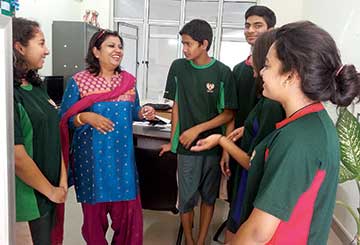Damayanti Mukherjee
“There is a brilliant child locked inside every student” – this faith has been my lodestar in my 20 year journey from being a teacher to now occupying positions at the higher levels of school management. It is easy to lose sight of this fundamental axiom as one gets caught up in the mechanics of effective administration – budgeting, logistics, marketing, etc.
 Teacher development/pedagogy training has been one of the most gratifying extensions of my role initially as the IBDP Coordinator and later as vice-principal – both in group sessions and individual counselling. It is, in a way, like working with the minds of students in a classroom and one encounters all sorts – curious and eager, bored and insular and even the resistant and aggressive. Having said that, I find that individual sessions with faculty members as I guide them through a path of suggestions based on class practice observations, or what we call walk-through at IISH, work almost like miracles. I may not always be able to comment on the subject delivery but advice about understanding the student and their needs, differentiated instructions, class management nuances are well accepted and it is rewarding to be accosted in the corridors by an excited face exclaiming: “Grade XX went really well Ma’am – even XYZ was very cooperative.”
Teacher development/pedagogy training has been one of the most gratifying extensions of my role initially as the IBDP Coordinator and later as vice-principal – both in group sessions and individual counselling. It is, in a way, like working with the minds of students in a classroom and one encounters all sorts – curious and eager, bored and insular and even the resistant and aggressive. Having said that, I find that individual sessions with faculty members as I guide them through a path of suggestions based on class practice observations, or what we call walk-through at IISH, work almost like miracles. I may not always be able to comment on the subject delivery but advice about understanding the student and their needs, differentiated instructions, class management nuances are well accepted and it is rewarding to be accosted in the corridors by an excited face exclaiming: “Grade XX went really well Ma’am – even XYZ was very cooperative.”
Parents are essential stakeholders of an educational organization and it’s imperative to alleviate any anxiety they feel regarding pedagogy in the classroom, curricula, pastoral concerns or individual requirements of their wards. I support the formation of parent councils and being in direct contact with as many parents as possible through personal contact. I believe in the power of effective communication – information, acknowledgement, response and action – which needs to be regular and alert. It is not that the running of a school depends on every suggestion given by parents – but it is important that every concern is heard and a platform for dialogue exists. I have always found that when a relationship exists, many issues that can snowball into crisis moments can be avoided. For the age group that we cater to in a K-12 school, every teacher needs to be straightforward yet compassionate, reassuring yet demanding of excellence, a peacemaker and a problem solver and for any one in a leadership role, these skills are not a choice but a mandate. I feel the demand for competence, commonsense, grit, initiative, empathy, and a positive attitude makes my job the best in the world as all these make this not a job but a vocation. And every evening as I travel back from school, I ask myself: Did I do the right thing at the right time, in the right way for the right reason? The reflection often serves to make one humble and thankful.
The author is Vice Principal, Indus International School, Hyderabad.
Related articles
From academic excellence to administrative acumen
Owning the unsolved problem
In the footsteps of ‘Madam’ Principal
Uneasy lies the head that wears the crown
